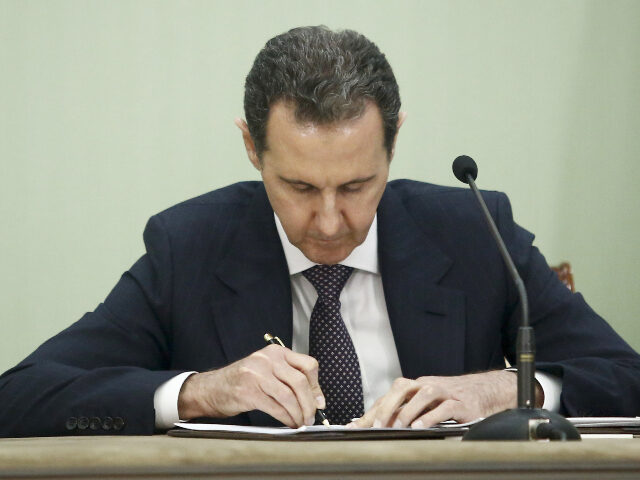The official account of the Syrian presidency on the encrypted messaging application Telegram published a statement on Monday purportedly from deposed Syrian dictator Bashar Assad in which he insisted that he never voluntarily resigned leadership of the country and did not abandon his soldiers.
The person claiming to be Assad insisted in the statement, “at no point during these events did I consider stepping down or seeking refuge, nor was such a proposal made by any individual or party. The only course of action was to continue fighting against the terrorist onslaught.”
Assad is believed to be in Moscow, Russia, after fleeing the country either late on December 7 or in the early morning hours of December 8. Assad fled as jihadists with the al-Qaeda offshoot terrorist organization Hayat Tahrir al-Sham (HTS) circled Damascus, dispersing the Syrian army with minimal fighting. HTS emerged the victor in the Syrian Civil War between Assad and several factions of opposition that began in 2011 – and appeared to have largely ceased following crushing Assad operations, enabled by Russia and Iran, against the rebels in 2017.
According to the Russian Foreign Ministry on December 8, Assad “resigned” from the presidency and left the country. The Kremlin later confirmed that Russian strongman Vladimir Putin had granted him political asylum and that Assad chose to step down on his own.
The Telegram statement alleging to be from Assad denies that he ever stepped down, calling all other claims “misinformation.”
“My departure from Syria was neither planned nor did it occur during the final hours of the battles, as some have claimed,” the statement read. “On the contrary, I remained in Damascus, carrying out my duties until the early hours of Sunday, December 8, 2024.”
“As terrorist forces infiltrated Damascus, I moved to Latakia in coordination with our Russian allies to oversee combat operations,” the statement continued. “Upon arrival at the Hmeimim airbase that morning, it became clear that our forces had completely withdrawn from all battle lines and that the last army positions had fallen.”
The person claiming to be Assad described themselves as “the person who, from the very first day of the war, refused to barter the salvation of his nation for personal gain, or to compromise his people in exchange for numerous offers and enticements.” He went on to describe himself as failing to abandon his soldiers and, “during the darkest years of the war, did not leave but remained with his family alongside his people, confronting terrorism under bombardment and the recurring threats of terrorist incursions into the capital over fourteen years of war.”
His prior record, he insisted, proved that Assad “cannot possibly be the same person who would forsake his own people or betray the army and nation to which he belongs.”
The statement concluded by appearing to concede that Assad had lost his power, claiming the nation had fallen “into the hands of terrorism” and that he had lost “the ability to make a meaningful contribution,” so his status as president was “void.”
“This does not, in any way, diminish my profound sense of belonging to Syria and her people – a bond that remains unshaken by any position or circumstance. It is a belonging filled with hope that Syria will once again be free and independent,” the person claiming to be Assad concluded.
The Telegram statement was published with a bizarre caption claiming that Assad had failed on numerous occasions to get Arabic media to publish it, so Telegram was his last resort.
Suggestions that the last hours of the Assad regime in Syria had been distorted by “misinformation” appears to be a reference to reports that Assad abandoned his forces. On Friday, Reuters reported that “aides, officials and even relatives were deceived or kept in the dark” about the Assad family abandoning the country until they had already left.
“Hours before he escaped for Moscow, Assad assured a meeting of about 30 army and security chiefs at the defence ministry on Saturday that Russian military support was on its way,” Reuters narrated, “and urged ground forces to hold out, according to a commander who was present and requested anonymity to speak about the briefing.”
The Russian government’s statements about the unfolding situation – in the first few days of the rise of HTS to power, the closest to any significant contact with the Assad regime – also suggested that Assad chose to flee, rather than that he was commanding troops until the last minute. Dmitry Peskov, Putin’s top spokesman, said that Assad chose to resign on his own and Russia did not pressure him to do so. He also said that Putin chose to offer him asylum because “Russia does not betray friends in difficult situations.”
The Russian Foreign Ministry also claimed Assad left instructions for a “peaceful transition of power,” contradicting the claim on Monday that he never resigned.

COMMENTS
Please let us know if you're having issues with commenting.